Bernie's heir - who will lead the left in 2020?

In 2016 Bernie Sanders's long-shot bid for the Democratic presidential nomination captured the hearts of American progressives. Two years later, the left is casting its eyes toward 2020, wondering who will carry the torch for the movement he galvanised.
The annual Netroots Nation convention of liberal grass-roots organisers, digital strategists and party activists offered an early opportunity for possible presidential hopefuls to test their progressive pitches.
The Vermont senator - who even at the age of 76 still appears to harbour presidential ambitions and would be a front-runner if he takes the leap - gave Netroots a pass this year, clearing the way for some lesser-known contenders to take centre stage.
The clear star of the three-day conference was Alexandria Ocasio-Cortez, the Democratic Socialist who shocked the political world by defeating a high-ranking New York congressman in a Democratic primary contest last month.
At only 28, however, Ms Ocasio-Cortez is still seven years away from being eligible to run for president.
When it comes to 2020, here's a look at the Netroots speakers in New Orleans who might be poised to run.

Elizabeth Warren
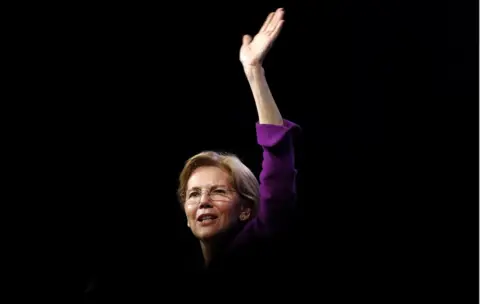 Reuters
ReutersThe Massachusetts senator has been a progressive star since she made a name for herself as one of the leading advocates for, and principal designer of, the Consumer Finance Protection Bureau.
An academic for most of her professional career, she became the first woman senator from Massachusetts in 2012 and frequently makes headlines with her sharp, acerbic questioning of bankers and Wall Street interests from her perch on the financial services committee.
Ms Warren has been a regular at Netroots Nation conventions, and her speech this year had the makings of a campaign stump speech (and not just for her 2018 Senate re-election bid). She touted her accomplishments and ranged beyond criticisms of income inequality and corporate greed to talk about criminal justice reform and immigration.
Effective politics has a personal element, and Ms Warren also recounted how her mother had to take a minimum wage job to pay the family mortgage after her father had a stroke - "a story of who I am", she said, but also one of how government regulation can help.
Key quote: "They will say that Democrats have to choose between being the party of the white working class and the party of Black Lives Matter. The will say it, but nevertheless we will persist."
Progressive hope? If Mr Sanders doesn't run, Ms Warren is the heir apparent to the movement. She's paid her dues, and she's earned their trust.

Cory Booker
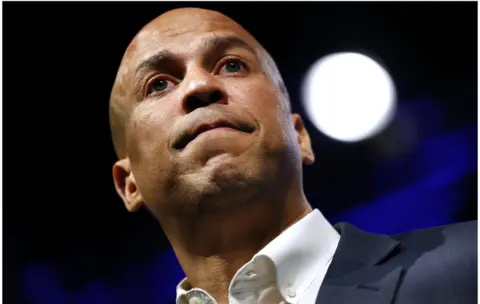 Reuters
ReutersProgressives have been suspicious of Cory Booker in the past - as a senator from New Jersey, he has had close ties to Wall Street financial interests. At Netroots, he touted other ties - to the distressed Newark neighbourhood where he lives, to underprivileged youth he's tried to support and, in particular, to one young man he knew who was murdered while he was mayor.
Of all the possible 2020 candidates, Mr Booker has one of the most polished stump speeches - and it was on display last week. He paces the stage with energy, as he talks about the nation's "crisis of vision" and the need to "reject the normalcy of injustice". He recites a familiar list of priorities - prescription drug prices, universal healthcare, criminal justice reform, gun control, immigration and public schoolteacher pay.
Key quote: "We have shown time and time again that the power of the people is greater than the people in power."
Progressive hope? Mr Booker has some work to do if he wants to earn the left's trust. They may never forget that back in 2012 he called Barack Obama's criticisms of Republican nominee Mitt Romney's venture capital business record as "nauseating".

Kamala Harris
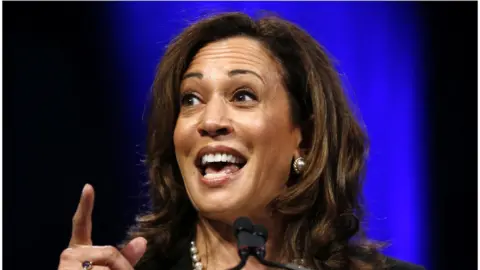 Reuters
ReutersCalifornia's junior senator is a rising star within the party - which has made her the target for some Sanders supporters, who question the former state attorney general's criminal justice record as a prosecutor.
In her Netroots speech, Ms Harris played to the crowd by incorporating the repeated calls at the conference for more diversity in the Democratic Party into her pitch. She accused critics of using the term "identity politics" to "diminish and demean" the legitimate concerns by racial and cultural minorities in the US.
Ms Harris said that she was going to talk about "uncomfortable truths" - like the fact that racism, sexism, homophobia, anti-Semitism and transphobia are still real problems the US has to deal with. What's more, she said, these forms of hate are a weakness that American enemies, like Russia, see as the nation's Achilles heel.
Key quote: "As we use our power and get beyond this dark chapter, and we will get beyond it, part of it is because we all agree that in this moment it is critically important that we speak truth."
Progressive hope? During Ms Harris's Netroots speech, members of the audience were nodding and "yessing" in agreement. One later said it was like a frank, dining-room table conversation on race. If "authenticity" will be the catchphrase for 2020 candidates, the senator's "uncomfortable truths" line may be her play.

Tim Ryan
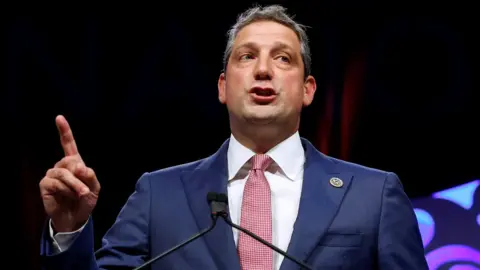 Reuters
ReutersIt is perhaps a reflection of how the Democratic Party has moved to the left over the past few years that Congressman Tim Ryan, who represents a rustbelt, blue-collar district in north-east Ohio, is calling for universal healthcare, tuition-free college education, comprehensive immigration reform, reducing US carbon emissions and legalised marijuana.
Mr Ryan unsuccessfully challenged Nancy Pelosi for the top Democratic leadership spot in the House of Representatives in 2016, urging his colleagues to embrace a new generation that better reflects the party's priorities. They didn't - but in the ensuing years calls for Ms Pelosi to step aside have grown increasingly prominent, as Republicans from Mr Trump on down continue to try to make the San Francisco liberal the face of the Democratic Party.
The Ohio congressman may have his eyes on a different prize now, counting on progressives to approve of his policies - and appreciate his appeal to the disaffected voters in the Midwest who voted for Barack Obama in 2012 but not for Hillary Clinton in 2016.
Key quote: "The corporate stranglehold across our economy has broken the systems across the board. We have to fix it."
Progressive hope? Democrats in 2020 will have to make a decision about whether to try to win the last war by recapturing Midwest blue-collar voters or fight a new one by assembling a different kind of electoral majority. If they choose the latter - and a big name like former Vice-President Joe Biden stays on the sidelines - Mr Ryan may have a puncher's chance.

Jay Inslee
Governors have traditionally had an advantage over members of Congress when running for president. Legislators can be bogged down by numerous, sometimes unpleasant votes on controversial matters, while the top officeholders in the states are able to skirt above the fray and build a record of executive action.
Barack Obama was the first sitting US senator to win the presidency since John F Kennedy. In the meantime ex-governors Jimmy Carter, Ronald Reagan, Bill Clinton and George W Bush all took the White House prize.
Washington Governor Jay Inslee, who has been making the rounds on the national Democratic circuit, could be hoping he's next in line. Although he didn't have a main-stage address at Netroots, he used a "featured panel" slot to tout his efforts to challenge the Trump administration's immigration policies in court, push for progressive voter rights laws, environmental reform, expanding healthcare coverage and funding early childhood education.
Key quote: "Washington state is not a perfect state. It's heading in that direction. And we're getting there as fast as we can."
Progressive hope? Mr Inslee doesn't crack many early lists of top 2020 contenders, but he'll have a solid progressive record to run on, and a donor base of West Coast technology money, if he chooses to enter the fray.

Steve Bullock
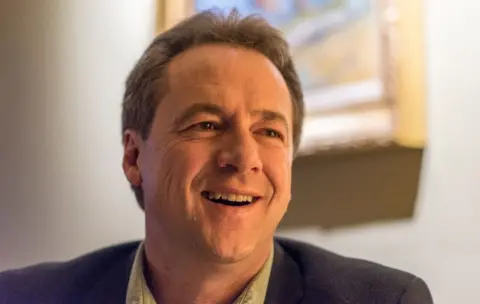 Getty Images
Getty ImagesMontana's governor is also making the rounds on the Democratic circuit. And while Steve Bullock is far from a household name, he's adopted the hot-button topic of net neutrality as a way to grab the attention of the progressive grass-roots.
In New Orleans, Mr Bullock moderated a panel discussion on the topic, giving him an opportunity to tout his state's efforts to step into the regulatory void created when the Federal Communications Commission abandoned Obama-era policies prohibiting internet service providers from giving the web traffic of some groups or companies priority over others.
Mr Bullock didn't have the opportunity to talk about his state's decision to expand Medicaid healthcare coverage for the poor, tighten campaign finance laws and raise the minimum wage - but expect that to come up as the governor tries to raise his profile nationally.
Key quote: "A free and open internet is truly one of societies great equalisers. It's just too important to give up."
Progressive hope? It's almost certainly going to be a crowded Democratic presidential field, which will make it harder for little-known candidates to get traction. Mr Bullock has liberal bona fides with a folksy Western demeanour that could catch a few eyes - if those eyes are looking.

Bill de Blasio
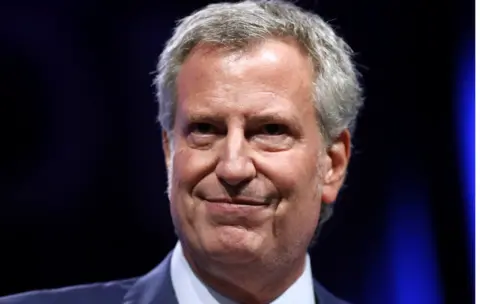 Reuters
ReutersNo one has ever gone from the office of mayor directly to the presidency. In fact, the last time a major political party chose a sitting mayor as their presidential nominee was 1812.
New York Mayor Bill de Blasio has a few advantages most mayors don't, however. First of all, he runs the largest city in the US. And secondly, he won his office on an ardently progressive platform, which was no small accomplishment. As he pointed out during his Netroots speech, his two immediate predecessors were billionaire financier Michael Bloomberg and former Republican presidential candidate and current Trump lawyer Rudy Giuliani.
And like Mr Giuliani, Mr de Blasio may have White House ambitions.
In New Orleans Mr de Blasio touted his record of progressive accomplishment in New York, such as moves to expand publicly funded early childhood education, roll back police "stop and frisk" authority and limit the ability of landlords to evict tenants. He said progressives should reject three lies even some of their political friends tell them - that they can't win, that they can't govern effectively and that they are a political minority in the US.
Key quote: "I have not mentioned Donald Trump on purpose… We don't make change by talking about him all the time. We make change with a bold, positive, progressive vision that speaks to everyday people's lives."
Progressive hope? If progressives are looking for a younger, more polished Bernie Sanders, Mr de Blasio may be their guy. Like Mr Sanders, however, he may have trouble winning outside of his home state and the mid-Atlantic.

Julian Castro
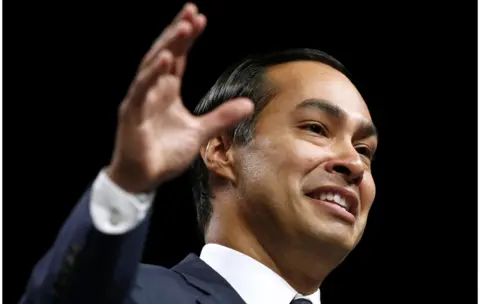 Reuters
ReutersThe former secretary of housing and urban development in the Obama administration had the unenviable task of closing out the final day of the Netroots conference after Ms Ocasio-Cortez had electrified the crowd with a full-throated defence of progressive values.
Electrifying things is not exactly Mr Castro's strong suit, and as he spoke some attendees began heading for the exits. Mr Castro was once, like Ms Ocasio-Cortez, considered a rising star in the party with appeal to a demographic group, Hispanics, that could form the backbone of future progressive majorities.
Mr Castro was on Hillary Clinton's vice-presidential short-list, before she opted for Virginia Senator Tim Kaine. He clearly has presidential ambitions and is making the motions to indicate he might try to realise them. His Netroots speech included calls for publicly funded pre-kindergarten and college education, raising the minimum wage and criminal justice reform, but in 2018 that's not enough to stand out from the pack.
Key quote: "Don't waste a minute of your time feeling daunted that Donald Trump has a base of die-hard supporters. So did Richard Nixon before he resigned, so did Roy Moore before he lost, and so will Donald Trump before he loses, as well."
Progressive hope? Progressive columnist Molly Ivins used to write that any successful presidential candidate has to have a "little bit of Elvis" in him. Mr Castro has the resume, but does he have the soul?

Tom Steyer
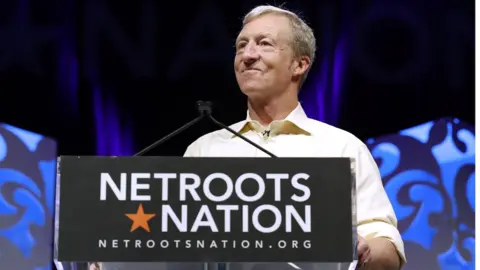 Reuters
ReutersThe California hedge-fund billionaire has been a deep-pocketed supporter of progressive causes for years. Since Mr Trump's election, however Tom Steyer has moved from the donor suite to the stage. He's bankrolled a multimillion-dollar effort to rally support for impeaching the president and tried to turn himself into the face of that movement.
At Netroots he launched a full-throated condemnation not just of Mr Trump but of Democrats who he said were too meek to publicly endorse Mr Trump's removal.
Time will tell whether Mr Trump's victory has thrown open the doors of the White House to billionaires of all political stripes with presidential ambitions. Mr Steyer isn't the only businessman eying a presidential run, but he appears to be the only one trying to woo the party's left.
Key quote: "The establishment Democrats are going to come here to speak to you guys because they want your support. But they won't take an actual step, a real move, to rein in a reckless, dangerous and lawless president."
Progressive hope? Mr Trump rocketed to the top of the Republican presidential pack in part by questioning Mr Obama's presidential legitimacy. Progressives' anger at the party establishment may boil over if they lose in 2018, but it still may prove difficult for some like Mr Steyer to take advantage of.

The field
If the Republican debate stages in 2016 seemed crowded, that may be nothing compared to Democrats in 2020. In addition to the names listed above - and Bernie Sanders and Joe Biden - there are at least a dozen more possible candidates testing the waters. Some may be hoping for progressive support, others will be targeting other Democratic voting blocs.
Governors Andrew Cuomo and John Hickenlooper, former Governors Terry Mcauliffe and Deval Patrick, Senators Kirsten Gillibrand, Amy Klobuchar, Chris Murphy, Sherrod Brown and Jeff Merkley, Congressmen Seth Moulton and John Delaney (who has already declared), former mayors Mitch Landrieu and Eric Garcetti, and businessmen Mark Cuban and Howard Schultz are all possibilities. And then there's Oprah.
It's going to be a busy two years.
